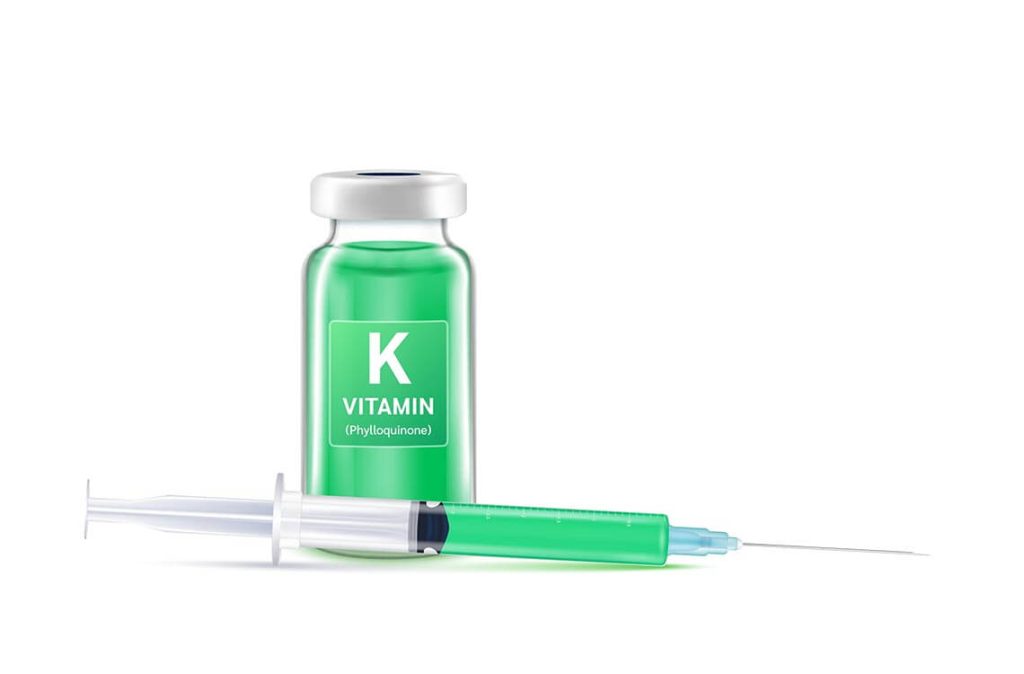Your baby will get dozens of shots after they’re born.
Most of these as you may well know are vaccines. Meant to protect your little one from viruses and diseases.
But did you also know that babies also get vitamin shots?
Particularly vitamin K, which helps with blood clotting; something that babies are not yet able to do on their own at such a young age.
According to Dr Jaspreet Loyal, Medical Director for Inpatient Pediatrics at the Yale New Haven Children’s Hospital, vitamin K shots are extremely important for newborns as it prevents life-threatening bleeding disorders.
Here’s what you need to know about vitamin K shots for babies.
Vitamin K and Its Purpose
Vitamin K is a fat-soluble vitamin that is found naturally occurring in the human body.
The main purpose of this vitamin is to help our body clot blood during injuries so that we don’t die from excessive bleeding.
However, vitamin K is only found in small amounts in the body because it is quickly metabolised in the blood.
The main source of vitamin K we get from our good comes from leafy greens like spinach, lettuce, cabbage, and bok choy.
Other sources found in smaller amounts include poultry and the good bacteria in our guts.
Why Newborns Need Vitamin K Shots
Unfortunately newborns, who can’t consume solid food or have enough of the right gut bacteria to produce vitamin K, are usually in short supply of this important nutrient.
Moreover, all babies have naturally low levels of vitamin K once they’re born.
This is because not much of the mother’s vitamin K makes it across the plancenta during pregnancy or through breastmilk after childbirth.
This is why some infants, despite being healthy suffer from vitamin K deficiency, a condition known as VKDB (or Vitamin K Deficiency Bleeding in Newborns).
Babies who have VKDB have a higher chance of bleeding. Usually in their brain, stomach or intestines.
The most dangerous thing about VKDB is that it doesn’t have any noticeable symptoms, not until it’s too late.
Common signs of internal bleeding as a result of low blood clotting factors include blood in the stool or urine, or bleeding around the umbilical cord stump.
That’s why getting vitamin K shots straight after birth is so important.
It allows your baby to produce important blood-clotting factors that can potentially save their lives.
When Newborns Are Given Vitamin K Shots
Doctors will typically administer a vitamin K shot to a newborn within the first six hours after childbirth.
If you give birth at a normal public hospital, you won’t have to ask for it.
Just like with vaccines, vitamin K shots are part of your baby’s afterbirth package deal.
So, don’t reject or refuse the vitamin K injection if it’s medically prescribed.
The Dosage of Vitamin K Given to Newborns
Vitamin K shots are normally administered at around 0.5 to 1 milligram in the form of intramuscular injection (usually the baby’s thigh).
Most of the vitamin K will be stored in the liver to be used by the body gradually over the next two to three months. Only one dose is needed.
Side Effects from Getting Vitamin K Shots
As with all injections, side effects from vitamin K shots include pain, bruising or swelling at the injection site.
However, take comfort in the fact that the ingredients used in the manufacture of vitamin K shots are 100% safe.
Moreover, studies have shown that vitamin K shots do not cause cancer or any other life-threatening diseases.
Alternatives to Vitamin K Shots
Some parents may think a shot is excessive, especially when oral vitamins exist.
While there are vitamin K supplements, research shows that they are ineffective in the case of newborns.
Unfortunately, if you’re the mother and you’re breastfeeding your baby, you also can’t naturally increase the vitamin K content in your breastmilk. Neither through diet nor supplementation.
Let Your Baby Get Their Vitamin K Shots
Millions of babies have been getting the vitamin K shots over the decades with no adverse side effects. So, there is no cause for concern.
The purpose of this article is to educate parents who may be anxious about their babies getting shots without doctors explaining what they’re for.
Seeing your baby receive an injection can be hard for a parent to watch. So, comforting them while the doctor administers the dose could help lessen your baby’s pain.
Just remember, the vitamin K shot is important for preventing serious bleeding conditions in your baby.
So, trust in your doctor, they have only the best in mind for your bundle of joy.
Disclaimer: The information provided in this article is for informational purposes only and should not be considered as medical advice from Motherhood. For any health-related concerns, it is advisable to consult with a qualified healthcare professional or medical practitioner.
For more insightful stories and fun recipes, stay tuned to Motherhood Story!
